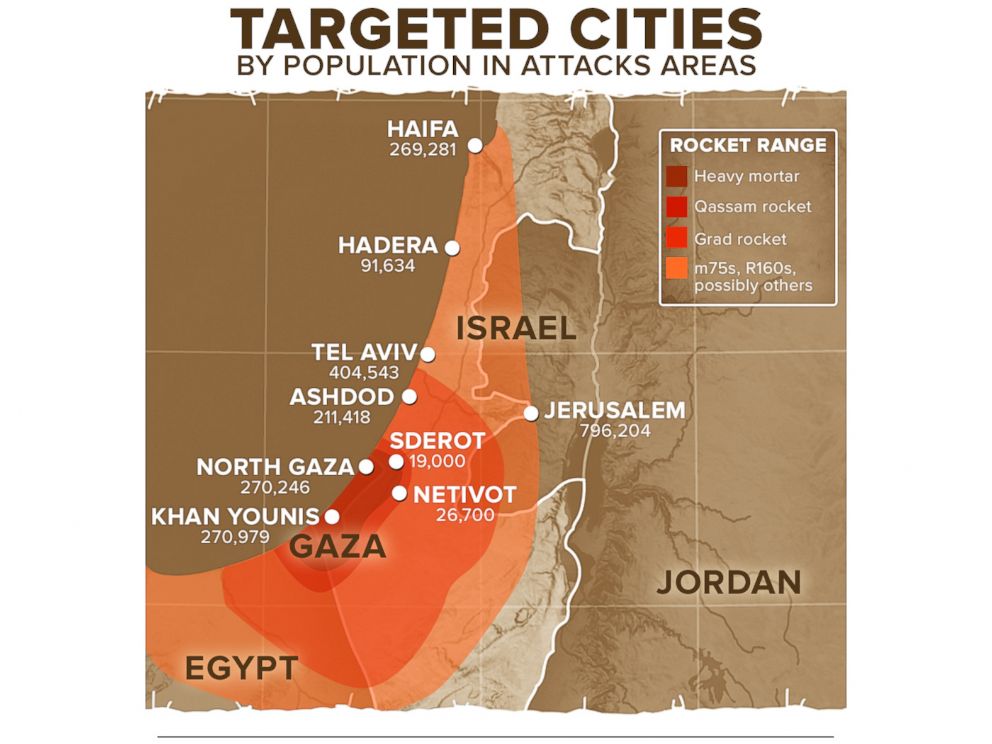Israeli Rockets Hit 200 Hamas Targets As Reservists Prepare For Possible Ground Invasion
Families of 'Birthright' travelers worried about security
— -- Israel has continued to launch rocket attacks on the Gaza Strip following days of violent exchanges -- and now leaders are signalling that the Israeli military reservists may need to prepare for a weeks-long ground invasion of the Hamas-controlled territory, officials said.
The Israeli military has announced that they have struck about 200 targets in the second day of their offensive.
Today's attacks came after a series of strikes against Israeli cities and the distance between the Gaza Strip and their northern-most Israeli target, near Haifa, suggests that Hamas is using longer range missile believed to have come from Syria.
‘Red Alert Israel’ Will Send a ‘Yo’ for Every Predicted Rocket Attack
Rockets Intercepted Over Jerusalem and Tel Aviv, Israel Amasses Troops at Gaza Strip
The death toll in Gaza has continued to rise, with Israeli Defense Forces targeting Hamas leaders and their households in many of their strikes.
The Associated Press reported that at least 22 fatalities have been reported in the Gaza Strip.
The official IDF spokesperson reported on Twitter that 72 rockets fired from Gaza hit Israel today, but no Israeli deaths have been reported.

City-run air raid shelters in Tel Aviv and Jerusalem were opened on Tuesday after the first rockets were intercepted by the Iron Dome in those cities, but that has not lessened security concerns for many Americans whose children are in the country as part of a Jewish organization's heritage trips.
Multiple parents have written on Birthright's Facebook page complaining that they had not heard about the status of their children.
One young woman, who is scheduled to leave for Israel on Monday as part of the next trip, told ABC News that she has not received any direct information from organizers and she is growing concerned about her safety.
"I feel as if they should have reached out to us," said Becca Gillette, 22. "They haven't sent us an email which I think they should have when the first rocket hit."
Gillette has written on Birthright's Facebook page looking for answers but said that she was discouraged by the fact that another commentor, who wrote that she was the mother of one of the students currently in Israel on an earlier Birthright trip, said that she had not received a security status update on her child.
"There's an updated questions and answers page and there are two questions that are pretty different and they have the exact same answer," Gillette said of the Birthright website.
The organization posted that none of the upcoming trips have been cancelled and none of the more than 3,500 currently on trips have left Israel early.
"The safety and well-being of participants is our primary concern and the ongoing priority across our organization," the organization stated on their website. Birthright organizers did not immediately respond to ABC's calls for comment.
One of the most concerning aspects of this week's rocket attacks comes from the range of the missiles as more Israeli cities have been targeted than in the last round of attacks in 2012.
In March, Israeli naval commandos seized what it said was a shipload of long-range missiles from Iran to Gaza.
Military spokesman Lt. Col. Peter Lerner said Tuesday's launch of the Syrian-made M-302 rocket toward northern Israel proved that Iran was indeed supplying Gaza with the weapons, and that some had slipped through despite Israel's efforts. He said Israel suspects Hamas still possesses dozens of other such missiles with a range of more than 100 miles, putting 5 million Israelis within their reach.
"We know when we are successful in stopping them. Obviously, they have been successful in smuggling some of these in," Lerner said. "We know there are these rockets in Gaza they have longer range, they have more firepower and they are more accurate."
The Associated Press contributed to this report




